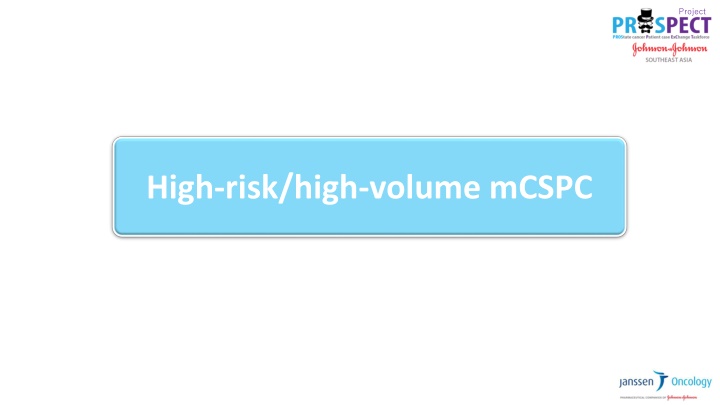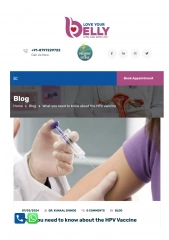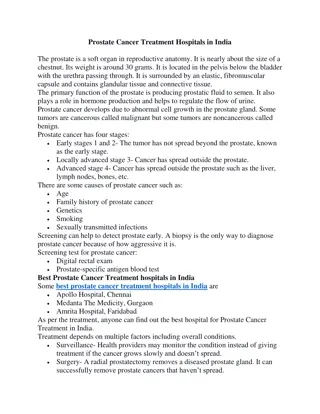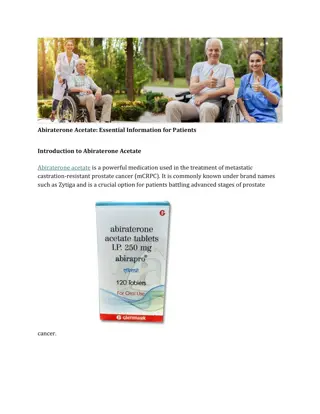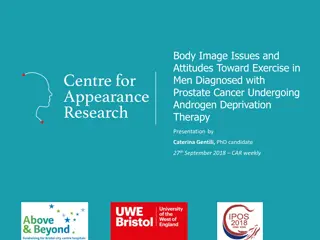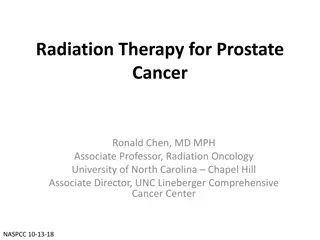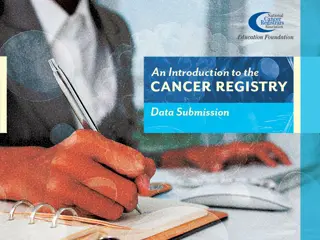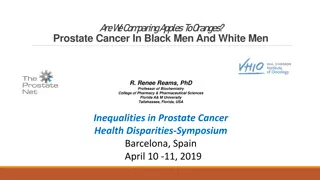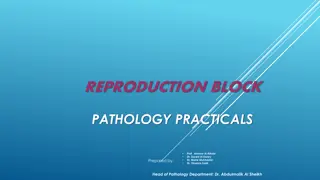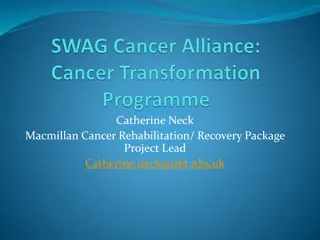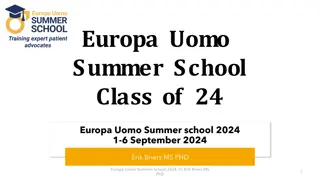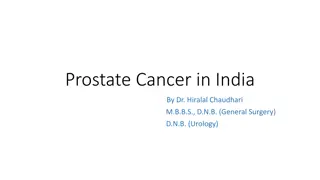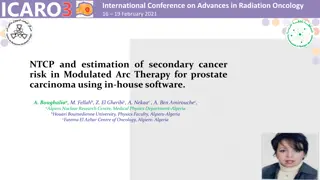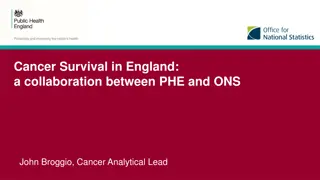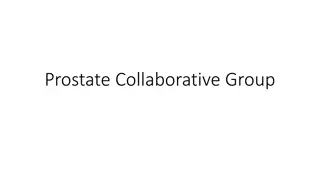Management of High-Risk Prostate Cancer: Expert Insights
In this case of high-risk/high-volume metastatic castrate-sensitive prostate cancer (mCSPC), a 64-year-old patient with specific clinical parameters was discussed among experts. Treatment options, including ADT monotherapy, combination therapies, and therapy intensification, were deliberated upon. The importance of individualized treatment decision-making based on age, regional considerations, and clinical data was emphasized by the panelists. Insights from various trials and expert opinions highlighted the need for a multidisciplinary approach and discussions with the patient to determine the optimal treatment strategy.
Download Presentation

Please find below an Image/Link to download the presentation.
The content on the website is provided AS IS for your information and personal use only. It may not be sold, licensed, or shared on other websites without obtaining consent from the author.If you encounter any issues during the download, it is possible that the publisher has removed the file from their server.
You are allowed to download the files provided on this website for personal or commercial use, subject to the condition that they are used lawfully. All files are the property of their respective owners.
The content on the website is provided AS IS for your information and personal use only. It may not be sold, licensed, or shared on other websites without obtaining consent from the author.
E N D
Presentation Transcript
Project High-risk/high-volume mCSPC
Project Case details and discussion plan Patient detailing A high-risk/high-volume de novo mCSPC case was discussed. The patient was aged 64-year-old with active lifestyle, working individual with mild hypertension and no other health conditions. Additional parameters included: T3bN1M1b Gleason score 4 + 5 = 9 in all 8 scores 5 bone metastases on bone scan left acetabular roof (3 cm), iliac crest x 2 (2 cm and 3 cm), dorsal right 7th rib (2 cm), T3 vertebral body (1 cm) mpMRI scan revealed extensive prostatic mass with left lateral extension into the seminal vesicle PSA 114 ng/mL, LDH 212 IU/L, ALP 72 IU/L, Hb 15.6 g/dL Discussion: How would you treat this patient? ADT monotherapy ADT + abiraterone ADT + apalutamide or enzalutamide OR OR OR ADT + docetaxel ADT + docetaxel + apalutamide or enzalutamide or abiraterone OR ADT: androgen-deprivation therapy; Hb: haemoglobin; LDH: lactate dehydrogenase; mCSPC: metastatic castrate-sensitive prostate cancer; mpMRI: multiparametric magnetic resonance imaging; PSA: prostate specific antigen
Project Panelist insights Experts shared regional insights about rational management of this case and choice of treatment for such patients. As the patient is young, maximum intensification of therapy is a possibility. The patient could go either for ADT + Docetaxel alone, ADT + novel hormonal therapy or for AA + docetaxel + ADT. To conclude, ADT plus one of these therapies can be preferred. The panelists agreed that: Choice of therapy depends on age, regional differences, reimbursement, and clinical data. A/Prof. Edmund Chiong ADT monotherapy is not the standard of care for patients with mCSPC. The patient certainly fits in with the various studies that has mentioned Abiraterone monotherapy. As the patient is young, the preferred therapy can be Docetaxel + AA or Docetaxel + AA + ADT. Discussing the pros and cons of the treatment with patient and a multi-disciplinary approach involving oncologist, radiologist, urologists is advisable. Dr. Loh Chit Sin A multidisciplinary team involving medical oncologists, neurologists will give insights into the course evidence and biology. There seems to be bias towards offering upfront chemotherapy because patients may be in a better position to tolerate Docetaxel initially than later. In Singapore, Abiraterone is accessible because it s launched generic. Discussion with the patient should always be considered. Panelists suggested the use of ADT + therapy intensification as the patient is young. Patient can be treated as per PEACE-1 data involving triplet therapy (ADT + Docetaxel + AA Radiotherapy). A/Prof. Lee Lui Shiong A/Prof: Associate Professor; AA: Abiraterone acetate; ADT: androgen-deprivation therapy; mCSPC: metastatic castrate-sensitive prostate cancer
Project Clinical insights CHAARTED1,2 STAMPEDE3, 4,5,6 LATITUDE7,8 STAMPEDE4,9 ,10 ENZAMET11 ARCHES12 TITAN13,14 Trials/ Parameters Arms ADT Doc ADT Doc ADT Abi ADT Abi ADT Enza ADT Enza ADT Apa Docetaxel in expo. arm 100% 100% 0% 0% 45% 18% 11% High vol./risk pts 65% 43% 100% 52% 52% 63% 63% CRPC or PSA-/PFS OS HRQoL - - 1. Kyriakopoulos CE, et al. J Clin Oncol. 2018;36:1080-87. 2. Sweeney CJ et al. N Engl J Med. 2015;373:737-46. 3. Morgans AK, et al. J Clin Oncol. 2018;36:1088-95. 4. Rush HL, et al. Oral presentation at ASCO GU 2020; abstract 14. 5. James ND, et al. Lancet. 2016;387:1163-77. 6. Clarke NW, et al. Ann Oncol. 2019;30:1992-2003. 7. Chi KN, et al. Lancet Oncol. 2018;19:194-206. 8. Fizazi K, et al. Lancet Oncol. 2019;20:686-700. 9. James ND, et al. N Engl J Med. 2017;377:338-51. 10. Hoyle AP, et al. Eur Urol. 2019;76:719-28. 11. Davis ID, et al. N Engl J Med. 2019;381:121-31. 12. Armstrong AJ, et al. J Clin Oncol. 2019;37:2974-86. 13. Chi KN, et al. N Engl J Med. 2019;381:13-24. 14. Chi KN, et al. Oral presentation at ASCO GU 2021; abstract 11. Abi: Abiraterone; ADT: androgen-deprivation therapy; Apa: Apalutamide; CRPC: castration-resistance prostate cancer; Doc: Docetaxel; Enza: Enzalutamide; Expo: exponential; HRQoL: health-related quality of life; OS: overall survival; PSA- PFA: prostate specific antigen progression-free survival Better No change
Project Discussion and Conclusion Chemotherapy is better in high volume and high-risk patients as confirmed by the expert panellists even though there is no comparative trial data in this regard. Treatment-wise toxicity There seems to be bias towards offering upfront chemotherapy because patients may be in a better position to tolerate Docetaxel initially than later. In young mCSPC patients, maximum therapy intensification + ADT is a possibility after discussion with the patient and consensus with multi-disciplinary team. In ENZAMET, ARCHES and TITAN trials, both Enzalutamide and Apalutamide work, and it is not known which one is better as of now. Safety profile of the patients depended on the treatment administered. Docetaxel is associated with alopecia, cytopenia, neuropathy, diarrhoea and fatigue; whereas Apalutamide with rashes, moderate fatigue and cardiovascular issues and Abiraterone with LFTs, hypokalaemia. Clinical data suggests that PFS and OS were observed to be improved in all the clinical trials. HRQoL scores were better for STAMPEDE and LATITUDE trials and there was no change for ARCHES and TITAN. ADT: androgen-deprivation therapy; HRQoL: health-related quality of life; LFT: liver-function test; mCSPC: metastatic castrate-sensitive prostate cancer; OS: overall survival; PFS: progression-free survival
Project THANK YOU!
